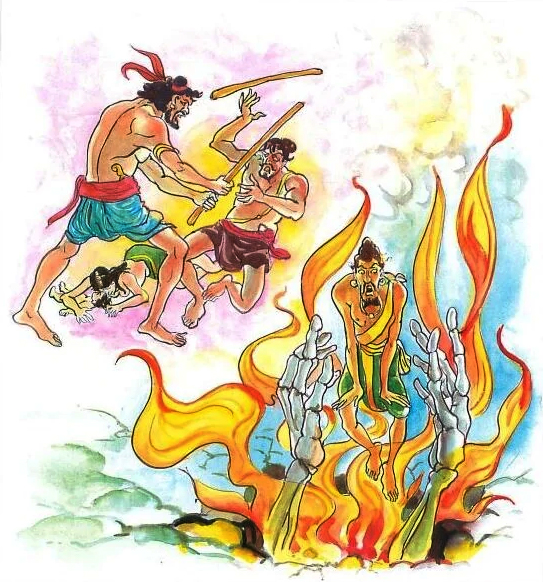Verse 42: A thief may harm a thief; an enemy may harm an enemy; but a wrongly directed mind can do oneself far greater harm.2
- diso: lit.; an enemy; a thief in this context. (The Commentary)
-
According to the Commentary, the mind, wrongly set on the ten-fold evil path, will cause ruin and destruction not only in this life, but also, even in a hundred. thousand future existences in Apaya.
The Story of Nanda, the Herdsman
While on a visit to a village in the kingdom of Kosala, the Buddha uttered Verse (42) of this book, with reference to Nanda, the herdsman.
Nanda was a herdsman who looked after the cows of Anathapindika. Although only a herdsman, he had some means of his own. Occasionally, he would go to the house of Anathapindika and there he sometimes met the Buddha and listened to his discourses. Nanda requested the Buddha to pay a visit to his house. But the Buddha did not go to Nanda’s house immediately, saying that it was not yet time.
After some time, while travelling with his followers, the Buddha went off his route to visit Nanda, knowing that the time was ripe for Nanda to receive his teaching properly. Nanda respectfully received the Buddha and his followers; he served them milk and milk products and other choice food for seven days. On the last day, after hearing the discourse given by the Buddha, Nanda attained Sotapatti Fruition. As the Buddha was leaving that day, Nanda carrying the bowl of the Buddha, followed him for some distance, paid obeisance and turned back to go home.
At that instant, a hunter who was an old enemy of Nanda, shot him down. The bhikkhus who were following the Buddha, saw Nanda lying dead. They reported the matter to the Buddha, saying, “Venerable Sir, because you came here, Nanda who made great offerings to you and accompanied you on your return was killed as he was turning back to go home.” To them, the Buddha replied, “Bhikkhus, whether I came here or not, there was no escape from death for him, as a wrongly directed mind can do oneself much greater harm than an enemy or a thief can.”
Then the Buddha spoke in verse as follows:
Verse 42: A thief may harm a thief; an enemy may harm an enemy; but a wrongly directed mind can do oneself far greater harm.
Dhammapada Verse 42
Nandagopalaka Vatthu
Diso1 disam yam tam kariya
veri va pana verinam
micchapanihitam cittam
papiyo nam tato kare.
Source: Tipitaka








Add a comment